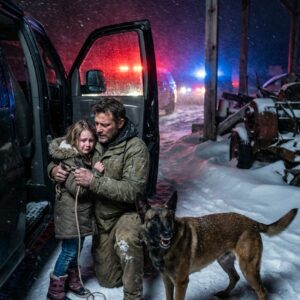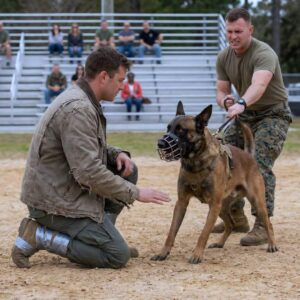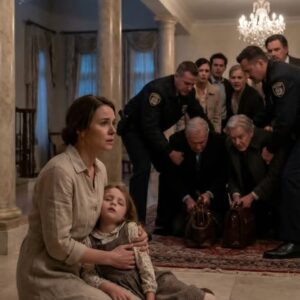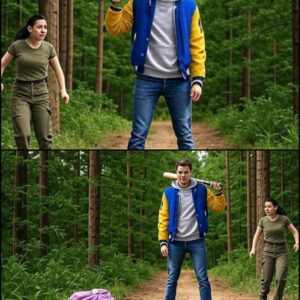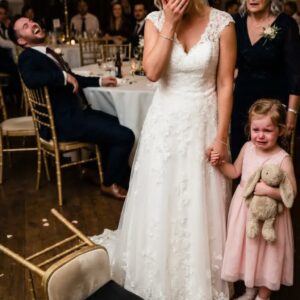William leaned back in his chair, the firelight painting quiet lines across his face. “You asked who I am,” he said. “For most of my life, I’ve been the man people called when they needed something built or bought. Real estate, investments, development projects—names on skyscrapers and plaques. The kind of life that makes noise but not meaning.”
He turned toward a photograph on the mantel—a smiling woman with dark hair and warm eyes. “That’s Eleanor,” he said softly. “My wife. We were married forty-three years. She was the kind of woman who believed that kindness was a currency more stable than gold.” His voice broke a little, like a piano key pressed too hard. “When she died eight months ago, I lost the only person who ever looked at me and saw more than a name on a check.”
I sat quietly, the fire’s heat warming my legs, the rest of me still unsure how to hold this moment.
“She built a foundation,” he continued, “the Eleanor Hartwell Foundation for Human Services. Food banks, shelters, education grants—everything you can imagine to keep people from falling through the cracks. After she passed, I thought I could keep it going from a distance. Sign the papers, approve the budgets. But the truth is, I was only pretending to care. When she died, so did my ability to believe in good things.”
He rubbed a hand over his face, as if erasing the memory. “So, I left it all behind for a while. No wallet, no driver, no staff. I told James I wanted to see if there was still decency left in the world when you remove wealth from the equation.” His eyes met mine. “For three weeks, I walked through cities—Denver, Salt Lake, even a few nights in Kansas. No one looked at me. No one spoke to me. I was invisible. Then there was you.”
I swallowed. “You were testing people?”
“Maybe,” he admitted. “But by the time I met you, the test had already turned into something darker. I had decided that if I didn’t find one good soul before that train arrived, I’d stop trying to exist at all.”
The words hung in the air like ice. The fire popped softly in protest.
He smiled then, not proudly but like a man discovering he’d been wrong in the best possible way. “And then a woman with a single suitcase and tired eyes sat beside me and asked if I’d eaten. You had ten dollars left to your name, and you gave it away as if it were the most natural thing in the world. You gave me back the proof that Eleanor was right about people.”
I couldn’t speak. The tears came without permission. “I didn’t know,” I whispered.
“You weren’t supposed to,” he said gently. “That’s the beauty of it. Real kindness doesn’t need an audience.”
He stood, walked to the sideboard, and poured two cups of tea. “I promised myself that if I ever found the person who reminded me who I was, I’d find a way to do something that mattered for them in return.” He handed me a cup and sat again. “I don’t give charity, Mrs. Henderson. But I do believe in purpose.”
He reached into his jacket and placed a folder on the table. “I want you to run something for me—the day-to-day operations of the foundation. The staff needs someone who understands struggle, not just numbers. Salary is seventy-five thousand a year, plus an apartment above the offices downtown. No catch, no tests. Just work that matters.”
The words didn’t land at first. They floated somewhere above my head, unbelievable, impossible. “You want to hire me?”
“I want to give you back what you already have—your worth,” he said simply. “You helped me remember that people are the point of money. Let me help you remember that you are the point of your own life.”
For the first time in months, I felt my breath come easily. “Yes,” I said. “Yes, I’ll do it.”
His smile deepened, and he looked genuinely relieved. “Eleanor would have loved you. She used to say angels don’t always have wings. Sometimes, they just carry small bills in big hearts.”
We both laughed then—quiet, stunned laughter that made the room feel like spring despite the snow clawing at the windows.
Six weeks later, I stood in the downtown Denver office of the Eleanor Hartwell Foundation. The walls were lined with photographs—children laughing, volunteers serving meals, families signing housing papers. My desk overlooked a city blanketed in snow and morning sunlight. The small apartment upstairs was warm and safe; I’d filled it with secondhand furniture and the smell of coffee every morning.
Each day, I met people who reminded me of where I’d been: mothers clutching children, veterans who spoke softly about sleeping in cars, women with eyes like mine had been—tired, scared, still fighting. I worked twelve-hour days and never felt exhausted, not really. For the first time, I woke up with purpose instead of panic.
William stopped by often. He’d ask about progress, but mostly he listened—to clients, to staff, to me. We became a quiet team: his vision, my empathy, the foundation growing like something with roots again.
Then one morning, a news crew from The Denver Post came by to film a short feature. William insisted I be included. “People need to see the face of hope,” he said. I protested, but the photo still ended up on the front page the next week: From Heartbreak to Hope: A Woman Rebuilds Denver’s Kindness Foundation.
Three days later, James knocked on my office door. “There’s someone here to see you, Mrs. Henderson. He says he’s your husband.”
My pen froze over a report. “My ex-husband,” I corrected automatically. “Tell him I’ll be right out.”
Through the glass window, I saw Wade sitting in the reception area. His once-perfect hair had thinned, and the tailored suit didn’t hide the sag in his shoulders. He looked like a man auditioning for the part of his former self.
I motioned for James to let him in. Wade stepped inside, offering a smile that didn’t reach his eyes. “Rhonda, you look… good. Really good.”
“What do you want, Wade?”
He glanced around the office, taking in the polished furniture, the photos, the nameplate on the desk. “I just wanted to see you. You disappeared after… everything.”
“You mean after you drained our accounts and left me with nothing?”
He flinched, then tried to recover with charm that had long expired. “Amber and I—well, that’s over. She wasn’t what I thought she was.”
“I’m sorry to hear that,” I said flatly. “But you didn’t come here for closure. What are you asking me for?”
His eyes flicked to the door, then back to me. “I’ve been thinking about us. About what we had. I made mistakes, Rhonda. But maybe we could—start over.”
I laughed before I could stop myself. “Start over? Wade, you made sure I couldn’t even afford a phone bill. I slept in a shelter because of you.”
His face went pale. “A shelter? God, I didn’t—”
“Of course you didn’t,” I said. “You never looked back long enough to see what you left behind.”
He shifted in the chair, his voice lowering. “I can make it right. I have a settlement drafted—half of what’s left. It’s not much, but—”
“What’s left?” I asked.
He exhaled. “Amber was expensive. Between the apartment, the car, the… habits. I’m not proud of it.”
I stared at him for a long moment, and all I could feel was a dull ache of pity. “You know what’s funny?” I said quietly. “You told me I’d be fine. You were right. I am.”
He reached for my hand, but I pulled it away. “Wade, I wish you well. Truly. But I don’t need saving anymore. And I certainly don’t need you.”
His jaw tightened. “You’ve changed.”
“Yes,” I said, standing. “That was the point.”
He left with his papers, and I sat alone in the silence he used to fill. For the first time, silence didn’t mean absence. It meant peace.
My phone buzzed—William’s name lighting up the screen. Dinner tonight? I have ideas for expanding the job training program.
I smiled as I typed back: I’ll be there.
Outside, snow had started to fall again—soft, deliberate, forgiving. Denver glowed beneath it, a city stitched together by lights and second chances.
And I thought of that moment at the train station, of a ten-dollar bill changing hands, and how something so small could rewrite an entire life.
But the story wasn’t over yet.
